GALLUP NEWS SERVICE
PRINCETON, NJ -- Results of a new USA Today/Gallup poll could embolden congressional Democrats to hold their ground as they wrangle with President George W. Bush and Republican leaders over an Iraq war funding bill. In line with the Democrats' position, roughly 6 in 10 Americans favor setting a firm timetable for withdrawing U.S. troops from Iraq; just over a third would rather keep a significant number of troops in Iraq until the situation there improves, as President Bush has called for. The results of the May 4-6 poll are similar to those of a month ago, but show somewhat more support for a timetable than was found two years ago.
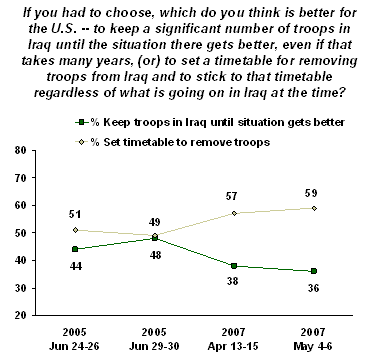
The new results are also consistent with a late April Gallup Panel survey that found 57% of Americans in favor of setting a timetable for withdrawing troops. (See "Americans Favor Iraq Timetable, but Not Necessarily a Speedy Withdrawal" in Related Items.) Though this puts the public generally on the Democrats' side of the withdrawal debate, it is important to note that the same poll found only 30% of Americans preferring to see troops beginning to return home within six months. An additional 27% would rather have withdrawal start sometime next year or beyond, while 39% oppose withdrawing troops by a certain time.
Withdrawing Troops Won't Itself Spawn More Terrorism
Critics have chided the Democratic position in favor of a timetable for withdrawal as a "timetable for defeat," and, in a newly released videotape, top al Qaeda operative Sheikh Ayman al-Zawahiri says the Democrats' withdrawal bill "reflects American failure and frustration." This may be disquieting to some, but whether it deters Americans from supporting troop withdrawal may depend on whether they perceive the United States to be less safe as a result.
At the moment, Americans do not perceive that withdrawing U.S. troops from Iraq on a timetable puts the United States at any greater risk of terrorism than it already faces. According to a pair of parallel questions in the new survey, a majority of Americans (55%) believe new terrorist attacks against the United States will occur if U.S. troops leave Iraq on a timetable, but 51% think such attacks will occur even if U.S. troops remain in Iraq.
The results to a different question in the same poll verify this finding. When Americans are asked whether they believe the United States is more likely to be attacked by terrorists if it keeps its troops in Iraq or if it withdraws its troops from Iraq -- or if the status of U.S. troops in Iraq makes no difference -- the majority respond that it will make no difference.
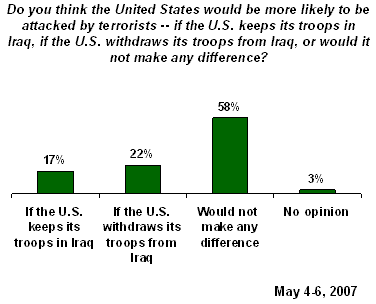
Additionally, just half of Americans believe pulling U.S. troops out of Iraq by the middle of next year will embolden countries like North Korea and Iran to make threatening moves against the United States.
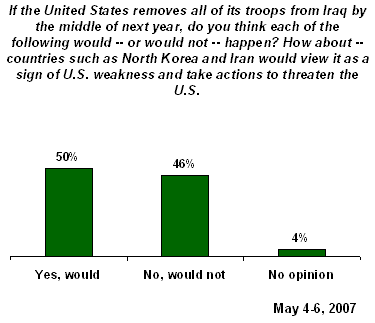
Withdrawal Heightens Risk of Civil War, al Qaeda Base of Operations
The new poll tested public attitudes about the likelihood of seven outcomes of the Iraq war happening either as a result of the United States keeping its troops in Iraq for the foreseeable future, or as a result of the United States removing all of its troops by the middle of next year, or -- where applicable -- under both scenarios.
While Americans consider the risk of terrorism against the United States the same regardless of whether U.S. troops stay in Iraq or leave, they do perceive greater negative consequences stemming from U.S. withdrawal in two areas.
- One is a full-scale civil war in Iraq: A substantial minority (47%) says this will happen if the United States remains in Iraq, but an even larger proportion (68%) foresees it occurring if the United States leaves the country.
- The other negative impact is the establishment of Iraq as a base of terrorist operations for al Qaeda: 47% say this will happen if the United States stays, while 66% say it will happen if the United States goes.
Americans are also slightly more likely to believe that a regional Middle East war could break out if the United States leaves Iraq than if it stays (52% vs. 42%).
Concern about these consequences of leaving Iraq could be offset by the widespread perception that staying in Iraq indefinitely would spawn increased anti-U.S. hostility throughout the entire region: 61% say if U.S. troops stay, Middle Eastern nations would become much more hostile to the United States. This appears to be a more persuasive argument for withdrawing than the possibility that the United States' relationship with its traditional allies could be damaged if it doesn't leave. Only 46% of Americans think allied relations would be severely damaged by staying in Iraq indefinitely.
|
Likelihood Each Would Happen Based on Status of U.S. Troops May 4-6, 2007 |
|||
|
If U.S.
|
If U.S.
|
Difference |
|
|
% |
% |
pct. pts. |
|
|
A full-scale civil war would occur in Iraq and result in the deaths of tens of thousands of Iraqis |
47 |
68 |
+21 |
|
Al Qaeda would use Iraq as a base for its terrorist operations |
47 |
66 |
+19 |
|
A broader war involving several countries in the Middle East would break out |
42 |
52 |
+10 |
|
There would be new terrorist attacks against the U.S., like the ones that occurred on 9/11 |
51 |
55 |
+4 |
|
Middle Eastern nations would become much more hostile to the U.S. |
61 |
n/a |
-- |
|
Relations between the U.S. and its traditional allies would be damaged severely |
46 |
n/a |
-- |
|
Countries such as North Korea and Iran would view it as a sign of U.S. weakness and take actions to threaten the U.S. |
n/a |
50 |
-- |
Admitting and Accepting Defeat
Only a third of Americans say they would be bothered "a great deal" if the United States is perceived as having lost the war in Iraq. Another 22% say they would be bothered a moderate amount while more than 4 in 10 would not generally be bothered by this.
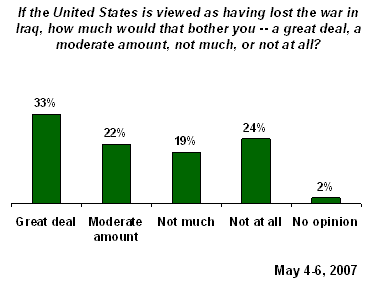
However, while they seem fairly well prepared to accept defeat, Americans do not readily agree that the United States will have "lost the war" in Iraq if conditions there have not improved by the time U.S. troops leave that country. Forty-five percent say they would believe the United States had lost the war under those circumstances, but slightly more say they would not see it this way.
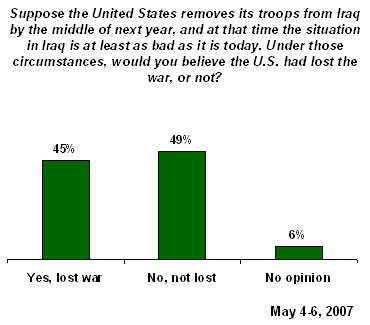
Gallup finds only modest differences between Republicans and Democrats on whether pulling U.S. troops out of Iraq under conditions no better than today's would constitute losing the war. A slight majority of Republicans (52%), compared with 41% of Democrats, say they would consider this losing the war. The slight majority of Democrats (51%) say it would not be losing the war.
There are much sharper differences between partisans in their tolerance for losing the war. More than half of Republicans (52%), compared with only 19% of Democrats, say it would bother them a great deal if the United States was viewed as having lost. A combined 78% of Republicans, compared with 40% of Democrats, say they would be bothered either a great deal or a moderate amount by this.
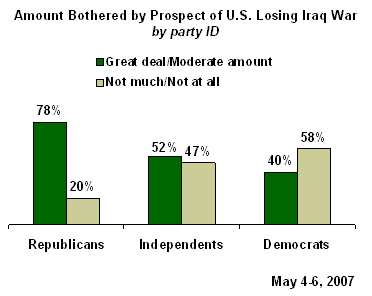
Survey Methods
Results are based on telephone interviews with 1,010 national adults, aged 18 and older, conducted May 4-6, 2007. For results based on the total sample of national adults, one can say with 95% confidence that the maximum margin of sampling error is ±3 percentage points. In addition to sampling error, question wording and practical difficulties in conducting surveys can introduce error or bias into the findings of public opinion polls.
19. If you had to choose, which do you think is better for the U.S. -- [ROTATED: to keep a significant number of troops in Iraq until the situation there gets better, even if that takes many years, (or) to set a time-table for removing troops from Iraq and to stick to that timetable regardless of what is going on in Iraq at the time]?
|
|
Keep troops in
|
Set timetable
|
No
|
|
% |
% |
% |
|
|
2007 May 4-6 |
36 |
59 |
5 |
|
|
|
|
|
|
2007 Apr 13-15 |
38 |
57 |
4 |
|
2005 Jun 29-30 |
48 |
49 |
3 |
|
2005 Jun 24-26 |
44 |
51 |
5 |
Next, we'd like to learn your views about what would happen both if the U.S. were to keep its troops in Iraq and if the U.S. were to remove its troops from Iraq. First,
Q.25-26 ROTATED
25. If the United States removes all of its troops from Iraq by the middle of next year, do you think each of the following would -- or would not -- happen? How about -- [RANDOM ORDER]?
|
2007 May 4-6 (sorted by "yes, would happen") |
Yes,
|
No,
|
No
|
|
% |
% |
% |
|
|
A full-scale civil war would occur in Iraq and result in the deaths of tens of thousands of Iraqis |
68 |
26 |
7 |
|
Al Qaeda would use Iraq as a base for its terrorist operations |
66 |
27 |
6 |
|
There would be new terrorist attacks against the U.S., like the ones that occurred on 9/11 |
55 |
41 |
4 |
|
A broader war involving several countries in the Middle East would break out |
52 |
42 |
6 |
|
Countries such as North Korea and Iran would view it as a sign of U.S. weakness and take actions to threaten the U.S. |
50 |
46 |
4 |
26. If the United States keeps its troops in Iraq for the foreseeable future, do you think each of the following would -- or would not -- happen? How about -- [RANDOM ORDER]?
|
2007 May 4-6 (sorted by "yes, would happen") |
Yes,
|
No,
|
No opinion |
|
% |
% |
% |
|
|
Middle Eastern nations would become much more hostile to the U.S. |
61 |
34 |
5 |
|
There would be new terrorist attacks against the U.S., like the ones that occurred on 9/11 |
51 |
44 |
5 |
|
Al Qaeda would use Iraq as a base for its terrorist operations |
47 |
47 |
6 |
|
A full-scale civil war would occur in Iraq and result in the deaths of tens of thousands of Iraqis |
47 |
46 |
7 |
|
Relations between the U.S. and its traditional allies would be damaged severely |
46 |
50 |
5 |
|
A broader war involving several countries in the Middle East would break out |
42 |
53 |
5 |
SUMMARY TABLE (Q.25A-D AND Q.26A-D)
|
2007 May 4-6 (sorted by "only if troops removed") |
Only if
|
Only if
|
Happen
|
Wouldn't
|
No
|
|
% |
% |
% |
% |
% |
|
|
A full-scale civil war
|
32 |
11 |
36 |
15 |
6 |
|
Al Qaeda would use Iraq as a base
|
28 |
9 |
38 |
20 |
5 |
|
A broader war involving several
|
26 |
16 |
26 |
27 |
5 |
|
There would be new terrorist attacks
|
21 |
17 |
34 |
25 |
4 |
27. As you may know, about 3,000 U.S. troops died during the first four years of the war in Iraq. If the United States keeps its troops in Iraq for an additional four years, do you think -- [ROTATED: more than 3,000 additional U.S. troops will die in Iraq over the next four years, fewer than 3,000 additional U.S. troops will die in Iraq over the next four years], or would the number of deaths be about the same as in the past four years?
|
|
More |
Fewer |
About
|
No
|
|
2007 May 4-6 |
44% |
20 |
31 |
4 |
28. Do you think the United States would be more likely to be attacked by terrorists -- [ROTATED: if the U.S. keeps its troops in Iraq, if the U.S. withdraws its troops from Iraq], or would it not make any difference?
|
|
If the U.S.
|
If the U.S.
|
Would not
|
No
|
|
2007 May 4-6 |
17% |
22 |
58 |
3 |
29. Suppose the United States removes its troops from Iraq by the middle of next year, and at that time the situation in Iraq is at least as bad as it is today. Under those circumstances, would you believe the U.S. had lost the war, or not?
|
|
Yes, lost war |
No, did not |
No opinion |
|
2007 May 4-6 |
45% |
49 |
6 |
30. If the United States is viewed as having lost the war in Iraq, how much would that bother you -- a great deal, a moderate amount, not much, or not at all?
|
|
Great
|
Moderate
|
Not
|
Not
|
No
|
|
2007 May 4-6 |
33% |
22 |
19 |
24 |
2 |
